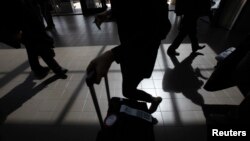WASHINGTON —
Early this month $85 billion in U.S. government spending cuts went into effect. The automatic budget reductions, known as the sequester, are hitting nearly every federal government agency and many employees are being furloughed - forced to take days of unpaid leave beginning April 1.
The budget cuts could have an impact on air travel and the aerospace industry. Flying in and out of U.S. airports could become a challenge, with delays on the ground and in the air.
The disruptions could begin when automatic government spending cuts hit the nation's aviation sector in April.
"This is very painful for us because it involves our employees," said U.S. Transportation Secretary Ray Lahood. "But it is going to be very painful for the flying public."
The budget cuts mean there will be fewer workers and longer wait times for travelers clearing security and customs checkpoints, officials say. The cuts also mean air traffic controllers will be forced to take unpaid days off. Fewer controllers in the tower will impact flight operations at the nation's busiest airports like here in Washington.
With fewer air traffic controllers to guide pilots, officials predict flight delays of up to 90 minutes at big airports.
"We need to have a certain number of bodies there [in the control tower] and, if they mandate to us that that many people cannot be at work, we can't open those positions and we cannot move as many airplanes or as much traffic," said Matt Byrd, who represents the National Air Traffic Controllers Association.
"We are going to have an effect throughout the national airspace," said Marion Blakey, president of the Aerospace Industries Association in Washington. She says the cuts will also harm the U.S. aerospace defense industry.
"In 2013 and 2014 alone, if sequestration is allowed to stand, we are talking about the loss of over two million jobs," she said. "We are talking about a blow to the growth of our GDP [Gross Domestic Product] of two thirds percent. That's huge."
"Anything that disrupts air travel is disruptive of the economy," said Virginia Senator Tim Kane.
Kane and other members of Congress are calling for an end to the spending cuts.
Maryland Congressman John Sarbanes worries that reduced traffic at Baltimore's BWI Airport could mean a loss of 94,000 jobs.
"You are going to have to contract the economic activity of the airport in order to accommodate that ripple effect," he said. "That sort of slow roll that is going to begin to happen, that accumulates over time and then it does begin to affect the bottom line of business in the area."
Still - transportation officials say budget cuts to civil aviation will not compromise safety on the ground or in the skies.
The budget cuts could have an impact on air travel and the aerospace industry. Flying in and out of U.S. airports could become a challenge, with delays on the ground and in the air.
The disruptions could begin when automatic government spending cuts hit the nation's aviation sector in April.
"This is very painful for us because it involves our employees," said U.S. Transportation Secretary Ray Lahood. "But it is going to be very painful for the flying public."
The budget cuts mean there will be fewer workers and longer wait times for travelers clearing security and customs checkpoints, officials say. The cuts also mean air traffic controllers will be forced to take unpaid days off. Fewer controllers in the tower will impact flight operations at the nation's busiest airports like here in Washington.
With fewer air traffic controllers to guide pilots, officials predict flight delays of up to 90 minutes at big airports.
"We need to have a certain number of bodies there [in the control tower] and, if they mandate to us that that many people cannot be at work, we can't open those positions and we cannot move as many airplanes or as much traffic," said Matt Byrd, who represents the National Air Traffic Controllers Association.
"We are going to have an effect throughout the national airspace," said Marion Blakey, president of the Aerospace Industries Association in Washington. She says the cuts will also harm the U.S. aerospace defense industry.
"In 2013 and 2014 alone, if sequestration is allowed to stand, we are talking about the loss of over two million jobs," she said. "We are talking about a blow to the growth of our GDP [Gross Domestic Product] of two thirds percent. That's huge."
"Anything that disrupts air travel is disruptive of the economy," said Virginia Senator Tim Kane.
Kane and other members of Congress are calling for an end to the spending cuts.
Maryland Congressman John Sarbanes worries that reduced traffic at Baltimore's BWI Airport could mean a loss of 94,000 jobs.
"You are going to have to contract the economic activity of the airport in order to accommodate that ripple effect," he said. "That sort of slow roll that is going to begin to happen, that accumulates over time and then it does begin to affect the bottom line of business in the area."
Still - transportation officials say budget cuts to civil aviation will not compromise safety on the ground or in the skies.










